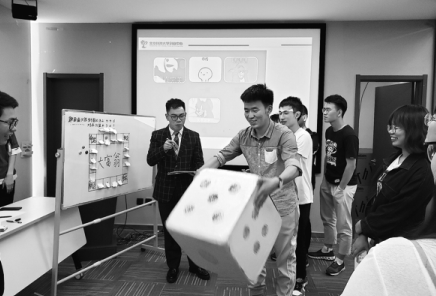Tutorial system works but could be improved, undergraduates say

A tutorial system for undergraduate students has received mixed reviews after it was launched by the University of Science and Technology Beijing in October 2018.
It engaged 1,360 faculty members, including four academicians from either the Chinese Academy of Engineering or the Chinese Academy of Sciences in tutoring more than 10,600 students, most of whom are freshmen, sophomores and juniors.
A symposium was held in November by the university to review how the program has progressed and what has been achieved in its first year of operation.
Song Bo, provost of the university, notes that the pass rate for compulsory subjects has risen among freshmen from eight out of the total 13 undergraduate schools last year.
And over the same period of time, undergraduates' participation in academic competitions or innovation and entrepreneurship events grew remarkably. For example, the number of participants in the Student Research Training Program, which encourages and sponsors innovative research conducted by undergraduate students, has increased from 2,631 to 3,595, with nearly half of their projects being instructed by their tutors.
Qin Zijie, a sophomore from the school of metallurgy and ecological engineering, says he benefited a great deal from frequent meetings with his tutor Feng Kai who pushed him to attend class regularly and on time, finish assignments independently and actively pursue extracurricular activities.
Under Feng's academic instruction, Qin participated in an exchange program between Japan's Tohoku University and the USTB in March where he presented his research report on computer simulation in manufacturing at steel mills.
"Feng also shares his personal experience with me to show how he improved learning efficiency and planning for a future career, which I found very helpful for coping with difficulties I faced in both study and in life," says Qin.
However, he also noticed some shortcomings in the tutorial system.
"Generally, we undergraduates have to put many courses on our schedules and the tutors also live under the stress of both teaching and carrying out scientific research. Hence, it's hard to fix a time when we can meet the tutors," he says, adding that some students might be held back at the end of class to talk with their tutors.
"To solve that problem, I think we could ask some schoolmates who have actively communicated with tutors to share their experience online. This might motivate their peers to take advantage of the program," Qin adds.
Sun Zhihui, an associate professor at the school of mechanical engineering, is now tutoring 11 undergraduate students.
From his perspective, different approaches should be used for students at different stages of their university journey.
"The teachers should help freshmen fit into campus life at the USTB by introducing them to the key subjects of their majors and urging them to build up a strong ability for self-study and make a clear plan for the future," he says.
For sophomores, according to Sun, the emphasis of tutoring lies in encouraging them to participate in various innovative and competitive events and coaching the students who failed certain tests in the previous semester.
"I also hold academic salons or sports activities where my senior and junior students can come to play and communicate with their younger peers. That creates an atmosphere full of solidarity and fraternity for the group of students I am mentoring," says Sun.
The tutorial program is obviously not a new thing in China as, in recent years, it has hit the campuses of many universities across the country, including Shanghai Jiao Tong University, Ningbo University, Shandong University and University of Chinese Academy of Sciences.
Yang Renshu, president of the USTB, highlights that implementation of the program should be thorough instead of formulaic to finally attain its goals, including improving the students' pass rate, increasing their eagerness to pursue further education, helping them grow into well-rounded people as well as achieving social satisfaction for the university.
原文链接:《中国日报》(2020年1月9日)
(责编:孟婍、陈丽萍)
未经允许不得转载:大学门户 » Tutorial system works but could be improved, undergraduates say
相关推荐
- 习近平给北科大巴基斯坦留学生回信
- 学校组织开展国际学生“感知中国·秦安行”活动
- 学生发展指导应该做什么
- 致全体学生停止返校的一封信
- 学校召开行政工作协调推进会
- 北科大巴籍博士:巴基斯坦需要学习中国生物治蝗技术
- 瞄准国际一流 深化部市合作 力争率先建成国际科技创新中心
- 北京科技大学师生热议“两会”开幕及政府工作报告
- 学校举行2020年“中信-CBMM吴宝榕铌钢奖学金”颁奖仪式
- 青年师生“活”学党史 “燃爆”青春
- 学校顺利完成2021年秋季新生报到工作
- 校长杨仁树一行赴宝钢股份有限公司访问交流
- 北科大教授出版《新型冠状病毒肺炎暴露风险防范手册》
- 学校党委副书记、纪委书记戴井岗一行走访校友企业推进产学研合作
- 今天起北京多所高校学生陆续返校
- 中英能源合作研讨会在我校顺利举行
- 乌克兰教育与科技部罗曼·格列巴副部长一行来访我校
- 北科大与宝钢共建“先进金属材料联合研究院”
- 学校开展2020年岗位(服务)能手和标兵评选活动
- 2021年高考招生录取 打造拔尖创新人才培养高地
新闻公告
- 打好配齐建强“组合拳” 锻造铸魂育人关键力量 03-17
- 校领导带队检查学校疫情防控工作及工程施工进展 03-16
- 绘就“大思政”育人同心圆 齐心协力助推思政课建设 03-16
- 学校召开2022年春季学期学生座谈会 03-15
- 学校召开2022年纪委(扩大)会议 03-14
- 冬奥会闭环志愿者圆满返校 03-13
- 海淀消防开展消防安全服务进校园活动 03-11
高考招生
- 北京科技大学2018年招生章程 08-05
- 北京科技大学2017年招生章程 08-05
- 北京科技大学2015年招生章程 08-05
- 北京科技大学2016年招生章程 08-05
- 北京科技大学2014年招生章程 08-05
- 2014年北科大国际本科3+1第七届招生简章 08-05
- 北京科技大学2011年本科招生章程 08-05
- 北京科技大学2012招生章程 08-05
- 北京科技大学2009年招生章程 08-05
- 北京科技大学2010年招生章程 08-05
